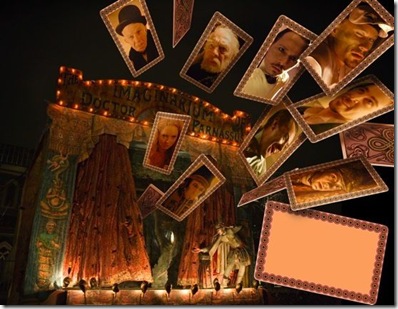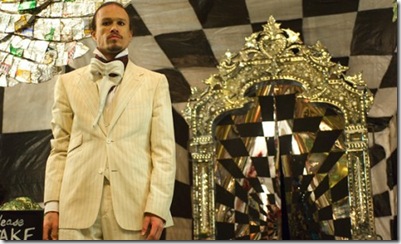We all know the story of how Heath Ledger’s death almost derailed Terry Gilliam’s latest film – and how three of Ledger’s friends [Johnny Depp, Jude Law and Colin Farrell] stepped in to finish the film after Gilliam tweaked the script to allow for their presences. The result, The Imaginarium of Doctor Parnassus, is one of Gilliam’s most accessible and intriguing films in years.
The story involves a series of bets between former monk Parnassus [Christopher Plummer] and Mr Nick, aka The Devil [Tom Waits] that have led to Mr. Nick’s claim on Parnassus’ daughter, Valentina [Lily Cole] in a few days from the film’s opening moments. Parnassus and his daughter have a travelling show that allows anyone who’s willing to take the chance to have their imagination unfettered in a world on the other side of a peculiar mirror. Also part of the presentation is Anton [Andrew Garfield] and the sarcastic – and almost always right Percy [Verne Troyer].
When Anton and Valentina rescue Tony [Ledger] from death by being hung off a bridge, he falls in with them and their fortunes seemingly take a turn for the better. Valentina also becomes fascinated by the newcomer much to the annoyance of Anton. For his part, Tony seems to have developed amnesia as a result of the trauma of his hanging.
For Gilliam – who seems to think the shortest between two points is a zigzag – Imaginarium is littered with the imagined worlds of several characters who exist mostly to show us the possibilities that await on the other side of Parnassus’ mirror. If, along the way, we learn of the foibles of his characters; the wages of sin, and the big picture war between order and chaos, good and evil and the like, well, so be it.
Then there’s the question of Tony. Is he what he seems, or is he one of three other possibilities? Does he deserve Valentina’s attentions; is Anton’s dislike of him more a case of jealousy, or does Anton have it right, and what is Mr. Nick’s interest in him? Finally, how does he lead to Parnassus and Mr. Nick’s final bet?
A week ago, I talked about how James Cameron brought genuine wonder back to the movie theater. Now, I’ve encountered another film that evokes genuine wonder – though far lower tech means [practical effects, non-3D CGI and, of all things, ideas!].
Imaginarium, like all of Gilliam’s films, is cluttered and awkward – in a genial, engaging sort of way. The throughline of the story is pretty simple, but the riffs Gilliam plays around are both delightful and frightful, involving and revolving. Like one’s imagination, it goes unexpected places and the damnedest things refer back to other equally strange moments. At times, the film feels like Edgar Allan Poe’s darkest nightmares; at others, Monty Python’s cheeriest nonsense [Python may have broken up long ago, but Gilliam’s time with them remains a prime influence].
Somehow, the most wonderful thing about Imaginarium is the way that Gilliam adds and discards ideas and quirks, almost at random, without losing the simplicity of his story – and the heart [or lack of same] of his characters. The guilt of the formerly immortal Parnassus; the yearning for independence of not overly protected Valentina; the heartache of the ignored Anton; the irascibility of put upon Percy – even the outer panache of the flawed and many-faceted Tony all shine through in the cast’s performances in the face of the oddest obstacles and strangest supports. Even Mr. Nick earns a hard won moment or two of sympathy – though we always know that if we acknowledge it, we will be taken advantage of…
Despite its wonder, though, Imaginarium’s clutter does get to be a bit much and there are moments when the wonder falters and the pace seems labored. In the end, Gilliam attempts much and succeeds far more often than he probably should. The result is a weird, slightly unwieldy thing that shows unexpected moments of grace.
Because of the simplicity of its throughline and its heart, Imaginarium succeeds in providing a thoughtful entertainment – and a performance that shows Heath Ledger was barely beginning to tap the reserves of his marvelous talent.
Final Grade: A-

